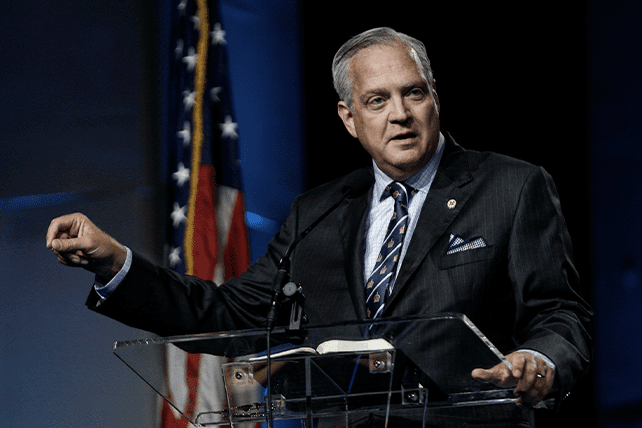Biblically, we are given a pretty clear direction for how to listen to preaching in this familiar passage from James 1:22-25.
But be doers of the word, and not hearers only, deceiving yourselves. For if anyone is a hearer of the word and not a doer, he is like a man who looks intently at his natural face in a mirror. For he looks at himself and goes away and at once forgets what he was like. But the one who looks into the perfect law, the law of liberty, and perseveres, being no hearer who forgets but a doer who acts, he will be blessed in his doing.
We are to be word-doers, showing by our response to the preached word that we are listening by obeying it. That’s how to listen to preaching.
The catechism also gives a wonderful answer on how to listen to preaching. The Westminster Larger Catechism asks then answers as follows.
Question 160: What is required of those that hear the Word preached?
Answer: It is required of those that hear the Word preached, that they attend upon it with diligence, preparation, and prayer; examine: What they hear by the Scriptures; receive the truth with faith, love, meekness, and readiness of mind, as the Word of God; meditate, and confer of it; hide it in their hearts, and bring forth the fruit of it in their lives.
From the scriptures and catechism, we can draw out four principles on how to listen to preaching
1. Prepare to Listen
You should make preparing for sermons a focal point of your week. God promises to be uniquely there among His people when His word is being proclaimed. As such, He is judging our attentiveness, willingness to hear, and sincerity in obeying. In order to listen to preaching well we should pray in readiness and ask in hunger to be fed, like we hear in Psalm 119:145-149.
I cried with all my heart; answer me, O LORD! I will observe Your statutes. I cried to You; save me and I shall keep Your testimonies. I rise before dawn and cry for help; I wait for Your words. My eyes anticipate the night watches, that I may meditate on Your word. Hear my voice according to Your lovingkindness; revive me, O LORD, according to Your ordinances.
The Puritans liked to call the Sabbath the “market day of the soul.” One goes to the market (or grocery store in our case) to purchase and stock up on what will satisfy their family’s hunger for the coming week. So as you come to worship, you should come asking God to give you what you need. Ask the Lord to use His Word to give you the direction, correction, encouragement, boldness, or strength you need. And come rested to hear a sermon. Do not stay up late on Saturday evening pursuing pleasures or working, then come to church with your heart filled with the world’s concerns and wonder why you are not hearing from God.
2. Examine Its Content.
The catechism says the preaching is to be examined by “what they hear by the Scriptures.” Of course, this idea is proof-texted in the WLC to that familiar passage in Acts 17:11. Speaking of the Berean church, it says, “Now these were more noble-minded than those in Thessalonica, for they received the word with great eagerness, examining the Scriptures daily to see whether these things were so.” What made the believers of Berea more noble-minded than the people in Thessalonica was not only had they “received the word with great eagerness,” but they were “examining the Scriptures daily to see whether these things were so.”
Recently I spoke from this text while giving a charge at the ordination service of one of our graduates. I told the congregation that we were not producing apostles at RPTS. And if the apostolic preaching of Paul required due examination to make sure it was in harmony with the Bible, then certainly their new pastor – and any minister of the gospel – should have their message examined to ensure it is in accordance with the Scriptures.
3. Receive It with Faith.
Listening truly to God’s Word and receiving it in faith is hard work on three fronts.
First of all, listening is difficult for people anyway. That’s why later in his letter James reminds us that we are to be “slow to speak and quick to hear.” Even when listening to the sermonic monologue, in our minds we can “talk to ourselves” by protesting or criticizing what we are hearing and fail to listen well. We can also grow sleepy, let our minds wander, and be distracted by anything from a sneeze in the sanctuary to the business of the next week.
Also, what we must listen to in a sermon is hard to hear (or at least should be). As Paul urged Timothy to “preach the Word” in his second epistle, he gave synonyms for preaching: “reprove, rebuke, and exhort” (II Tim. 4:2). As sinners, we do not like to be confronted or corrected. Yet that is exactly what preaching is to do.
Finally, thinking God’s thoughts after Him is no easy task for a mere finite mortal (Is. 55:10-11). Jesus and the apostles did not always give milk. They expected their hearers to think, and to think long and hard so they would grow into maturity and be able to eat the meat of the Word. We need the Spirit’s help to that end.
So when we come to church to worship and hear The Word, we must think and receive the Word of God by listening to Jesus, for Jesus, and by the power of Jesus. To do so takes faith in Christ.
4. Practice It with Action.
The catechism says above that we are to bring forth the fruit of the Word in our lives. The Westminster Directory of Public Worship says similarly that believers are to “practice it in their lives.” Talking about and discussing the sermon with others afterward, with a focus on how to practice it, is a wonderful way to encourage obedience.
Learning how to obey God’s Word in a regular fashion may be uncomfortable at first. Like a beginning violin player, trying to talk about a sermon may seem to be awkward and squeaky. You may feel like you are trying to be more spiritual than others or you are not sure what you are saying is accurate. But just practice! Ponder with others the things that you have heard. As you listen to preaching, isolate some key truths and applications you need to make. Find ways to encourage one another through the week to follow God’s Word.
Remember: the sermon is not over when the preacher says “Amen.” Its fitting conclusion is the message bearing fruit in your and the other hearers’ lives.
This article on how to listen to preaching originally appeared here,

























